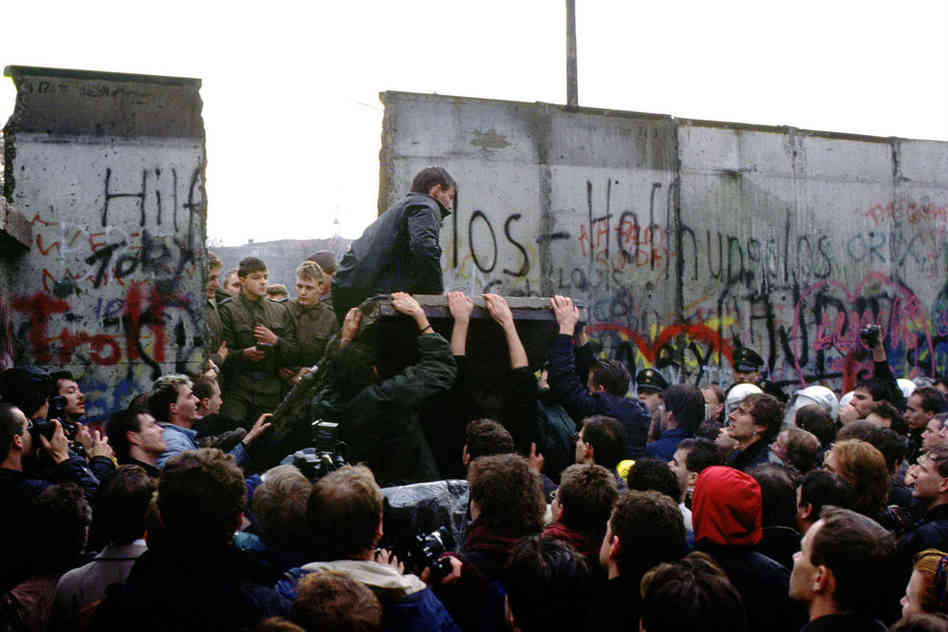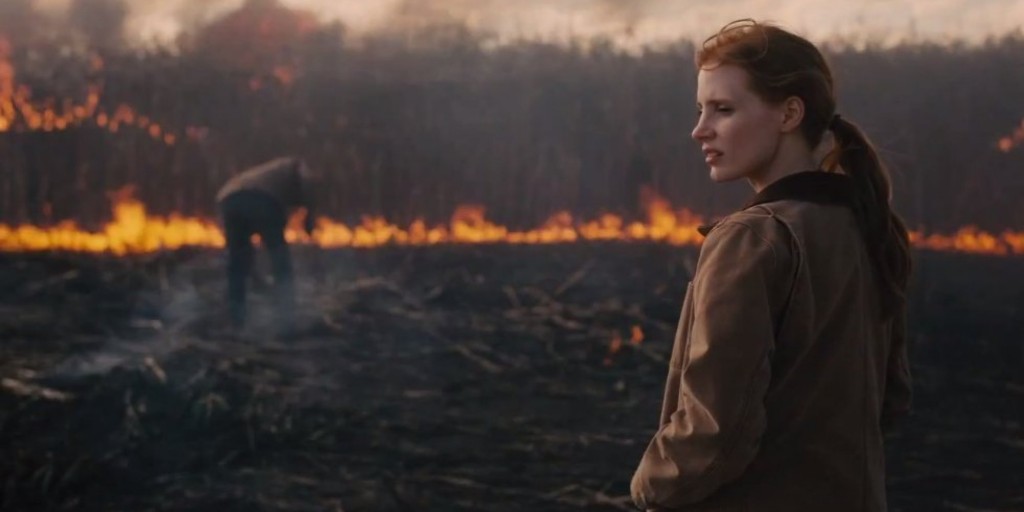Vizzini: HE DIDN’T FALL? INCONCEIVABLE!
Inigo Montoya: You keep using that word. I do not think it means what you think it means.
— The Princess Bride

When the Inconceivable Happens
Yesterday was the anniversary of 25th anniversary of the fall of the Berlin Wall. (Has it really been 25 years?) The fall of “the Wall” was one of those events that profoundly shook my conception of the world. Growing up, as I did, in the Midwest in the 1980s, there were certain things I knew to be true:
- The United States was destined to reach the stars.
- The Soviet Union was the Evil Empire, with whom we would forever be locked in a stalemate.
- The Republican Party had the best plan for keeping America economically and militarily successful.
- I was safe in my home because the continental United States would never be attacked.
Each of these myths was ultimately undermined by an event in my lifetime:
- The explosion of the space shuttle Challenger in 1986, when I was 11 yeas old, began to undermine my faith in the myth of technological progress.
- The fall of the Berlin Wall and the collapse of the USSR in 1989 when I was 14. Breaking the stalemate between the USSR and the USA had previously been inconceivable — because it implied nuclear war.
- The defeat of incumbent George Bush I in the 1992 election, combined with my first real exposure to other political viewpoints, when I was 17. Until that time, it had never occurred to me that a sitting president could be unseated.
- The attack on the World Trade Center in 2001 when I was 26.
Of course, each of these seemingly unprecedented events had their precedents. There were many disasters in the history of the U.S. space program, perhaps most notably Apollo 1 in 1967. The fall of the USSR, while apparently a surprise to the CIA, should not have been a surprise to anyone with a modicum of knowledge about the history of empires. My own experience of the peaceful end of the Reagan era hardly compared with the Watergate scandal which my parents lived through, much less the Kennedy assassination. And the attack of the World Trade Center surely was no more shocking to me than Pearl Harbor was to my grandparents.
My parents’ generation experienced similar paradigm shattering experiences, including the U.S. defeat in Vietnam, Watergate, and the assassination of Kennedy. For my grandparents, it was the Great Depression, Pearl Harbor and the Holocaust. I think we all must grow up thinking that certain things could never happen … until they do. Thinking back, humanity seems to be plagued by events which, at the time, seemed inconceivable. Many of these events caused people to question the existence of a just God, from the Black Death in the 14th century, which killed a third of Europe’s population and over half of the population in cities like Paris, Florence, and London, to the 1755 Libson earthquake, which registered an 8.5-9.0 and killed people as they sat in church on the morning of All Saints’ Day, to the trench warfare of WWI which created a generation of atheists, to the Holocaust.
On the flip side, there have been world-shattering changes for the better. For people in the South, living in the first half of the 20th century, the Civil Rights movement was probably inconceivable. My parents joined the Mormon church the same year that the church hierarchy decided to grant priesthood privileges to black males (1978) … something which people had said would never happen. People are saying the same thing about Mormon women and the priesthood now, but I think “the times are a changing’.” The success of the same-sex marriage rights movement is another recent example. Honestly, I didn’t think I would live to see that particular historical arc curve toward justice, but I am glad I did.
The Myth that Things Will Always Be This Way
It is easy to live under the illusion that things are the way they always have been and they will always be the way the are now. But there really is no excuse for this kind of failure of imagination, at least among adults. This is true on both the personal level, as we contemplate our individual deaths, and on the collective level, as we contemplate the future of our society and our species. Every adult person should realize that, one day, the United States will no longer exist. No doubt this would be considered unpatriotic heresy by many people, but it seems an inevitable conclusion looking at the history of other empires. What’s more, one day, human beings will no longer exist. Think about that for a minute. Let it sink in. One day, no matter how much we rage against the dying of the light, we will not be.

Yesterday, I went to see the movie, Interstellar, which came out in theaters on Friday. The movie is set in a near-future, where the earth can no longer sustain humanity. The population has been decimated by famine. The USA still exists, but is no longer what it once was. And a combination of blight and dust storms seems intent on wiping out what remains of a struggling humanity. (I’ll have more to say about the movie in a future post.) We’ve seen many such post-apocalyptic cinematic visions in the past, from Road Warrior to Terminator to The Postman to, more recently, The Book of Eli. What’s disturbing about Interstellar is not the changes, but the similarities, of the near-future depicted in the movie to the present day. Many post-apocalyptic stories describe a future that is unrecognizable to present-day Americans. But the future of Interstellar, a future of environmental disaster and only partial social collapse, seems very real. (I had a similar reaction to Octavia Butler’s science fiction series, Parable of the Sower and Parable of the Talents.)
It occurs to me that humanity’s paralysis over the impending environmental (and corresponding economic) collapse is a function of the psychological strength of the myth that “things will always be the same”. The sun always rises in the morning, and winter (more or less) predictably follows autumn which is followed by spring, and I go to work during the week, and rest on the weekend, and put money in my 401K, and go on being a good consumer, largely unperturbed by war and famine and plague, and it’s easy to believe that things have always been this way and always will be …
… but they won’t.
It is likely that I, or maybe my children, will live to see a day when our everyday experience, living in the United States today at the beginning of the 21st century, will be entirely foreign to the children being born at that time. Things will not always be as they are. And I think realizing this may be the first step toward making the system-level changes which are needed to address the environmental disaster. Certain things which we take as inevitable … things like capitalism, for example … are not inevitable. As Naomi Cline writes in her new book, This Changes Everything: Capitalism vs. The Climate,
“[O]ur economic system and our planetary system are now at war. Or, more accurately, our economy is at war with many forms of life on earth, including human life. What the climate needs to avoid collapse is a contraction in humanity’s use of resources; what our economic model demands to avoid collapse is unfettered expansion. Only one of these sets of rules can be changed, and it’s not the laws of nature.”
“Because, underneath all of this is the real truth we have been avoiding: climate change isn’t an ‘issue’ to add to the list of things to worry about, next to health care and taxes. It is a civilizational wake-up call. A powerful message—spoken in the language of fires, floods, droughts, and extinctions—telling us that we need an entirely new economic model and a new way of sharing this planet. Telling us that we need to evolve.”
“So we are left with a stark choice: allow climate disruption to change everything about our world, or change pretty much everything about our economy to avoid that fate. But we need to be very clear: because of our decades of collective denial, no gradual, incremental options are now available to us.”
One way or another, capitalism — at least a capitalism built on a model of infinite growth — will no longer be. My hope, is that we humans are around to see that day, and that the demise of this particular economic system does not correspond with the demise of our species. What we need is the courage to imagine a different future — the courage to imagine both a future where we have committed collective suicide through our desecration of the environment and a future where we have escaped that fate by creating a new kind of society.
Paganism: A Religion of the Imagination
Where does Paganism come in? Well, if our problem is really a failure of imagination, then I think Paganism is uniquely suited to help. Religion scholars, Robert Ellwood and Harry Partin, have located imagination at the core of the Pagan paradigm:
“The unifying theme among the diverse [Neo-Pagan] traditions […] is the ecology of one’s relation to nature and to the various parts of one’s self. As Neo-Pagans understand it, the Judaeo-Christian tradition teaches that the human intellectual will is to have dominion over the world, and over the unruly lesser parts of the human psyche, as it, in turn, is to be subordinate to the One God and his will. The Neo-Pagans hold that, on the contrary, we must […] cooperate with nature and its deep forces on a basis of reverence and exchange. Of the parts of man, the imagination should be first among equals, for man’s true glory is not in what he commands, but in what he sees. What wonders he sees of nature and of himself he leaves untouched, save to glorify and celebrate them.
“What Neo-Pagans seek is a new cosmic religion oriented to the tides not of history but of nature — the four directions, the seasons, the path of the sun — and of the timeless configurations of the psyche. They seek not that morality which comes from imposing the will on reluctant flesh, nor the mystical trance which is the fruit of asceticism, but the expansiveness of spirit which comes from allowing nature and rite to lower the gates confining the civilized imagination. For them, this is the spirit called up by the names ‘pagan’ and ‘polytheism.’
“[Neo-Pagans] seek to restore a proper balance between masculine and feminine symbolization of the sacred. They seek to recover a sense of wonder and respect as religious feelings toward nature in all its moods and toward the human body and psyche. Thus they want to find a new totality, perhaps in reaction to a schizophrenic culture. They look for it in a new cosmic religion that vehemently rejects the religious value of history, while it radically affirms the religious value of raising the level of consciousness through stimulation of the imagination by ritually creating a suggestive and sacred milieu.” (Religious and Spiritual Groups in Modern America)
We Pagans are uniquely capable of imagining things being different than they are. After all, we are Pagans in (a predominately) Christian America! More than any other religious group in the West, perhaps, Pagans can remember a time when Christianity was not the dominant mode of religious discourse. And we can imagine a future which is not only post-Christian, but post-monotheistic. And to the extent that our pathological relationship with the environment is bound up with a monotheistic paradigm, we are uniquely situated to help imagine a society which has a radically different relationship with the environment. Indeed, much of Pagan ritual and practice is designed to help us realize just that possibility. Starhawk calls this “Radical imagination: refusing to accept the dominators’ picture of the world. Thinking outside the lines. Daring to dream what has never been before, to think the unthinkable, and then to create it.”
“Many years ago the poet Diane di Prima wrote a line that comes back to me now: ‘The only war that counts is the war against the imagination.’ I often wondered what she meant by it, but now I think I understand. All war is first waged in the imagination, first conducted to limit our dreams and visions, to make us accept within ourselves its terms, to believe that our only choices are those it lays before us. If we let the terms of force describe the terrain of our battle, we will lose. But if we hold to the power of our visions, our heartbeats, our imagination, we can fight on our own turf, which is the landscape of consciousness. There, the enemy cannot help but transform.” (The Fifth Sacred Thing)
Imagination gets a bad rap in our contemporary scientistic culture which fetishizes rationality and objectivity. But imagination has been behind every major revolution in human history, whether technological, social, or religious. If the environmental crisis is a result of a failure of imagination — a failure to imagine the disastrous consequences of our current economic system and a failure to imagine that our economic system could be different — if what we need is the courage to imagine things can be different, well then, I think we we are playing on Paganism’s home turf now.















